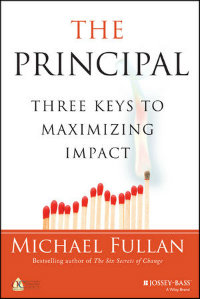Three Keys to Maximizing a Principal’s Impact
The Principal: Three Keys to Maximizing Impact
By Michael Fullan
(Wiley, 2014 – Learn more)

Michael Fullan’s work is a great symphony of theory, practice, data, advice and inspiration. Here he has written a book with short powerful chapters that serve as guidelines and examples of what it takes to make the role of principal successful. His writing is fresh and funny at times and his references are extensive.

Benchmarks gained through research
The bulk of research for the book comes from videotaping in three schools in Ontario, Canada over the course of the school year to collect data about the effects of various leadership practices. Fullan (himself a Canadian) also references similar data he collected in 2010 as well as referencing the work of all the other major researchers in administrative and leadership topics.
Fullan discusses three “Keys” –
► Leading Learning
► Being a District and System Player
► Becoming a Change Agent
In Chapter Three, “Leading Learning,” he completely reviews the literature on the subject, including work by Viviane Robinson and Tony Bryk, and then expands on his ideas of developing professional capital, including human capital and social capital. He talks about being a talent scout and a social engineer. There are plenty of Dos and Don’ts in this chapter for the practical minded, as well as powerful abstract discussions of the nature of good leadership.
Tested practices that work
Chapter Four, “Being a District and System Player,” is where Michael Fullan utilizes examples from his own research and observations of schools in Canada. He relates practices that he has seen successfully achieving results, including cross visits of subsets of teachers and “summits” during which an individual school leader will present his or her progress over a period of time to another cluster of school leaders. There is a lot of substance here for administrators to match up to their own reflective practices.
Fullan’s final key, “Becoming a Change Agent,” is actually a title of one of his prior books, but he adds input on the topic from subsequent researchers including the recommendation that readers take Lyle Kirtman’s self assessment about leadership competencies. He shares an excellent example from the jazz world – when Miles Davis is complaining that John Coltrane plays too long. Coltrane claims he “can’t stop playing” and Miles Davis suggests “taking the horn out of your mouth.” This analogy is provided for those who micromanage leadership as an encouragement to “put down the horn” in response to feedback back from colleagues. He discusses the nuances of “judgment” in leadership here and is very supportive in his reflective checklist for this chapter.
I was pleasantly encouraged by reading this book and will take many lessons away from it, including those about valuing human capital as well as tactical advice in establishing good leadership practices. If you want to be fully informed with a great research review on administrative practices and competencies over the last five years I highly recommend The Principal – Three Keys to Maximizing Impact by Michael Fullan.
Editor’s note: See another review of The Principal here at MiddleWeb.
After being married in the spring, Holly Foley (formerly Procida) has relocated to a different part of New Jersey but so far still teaches Social Studies in Bergen County (Charles DeWolf Middle School, Old Tappan). As she continues her quest for an administrative position, she is reading as much as possible about the job of principal. She hopes to be a part of an administrative team at some point in the near future.



































